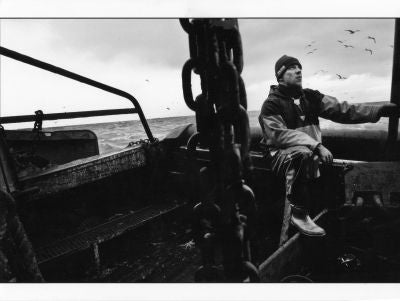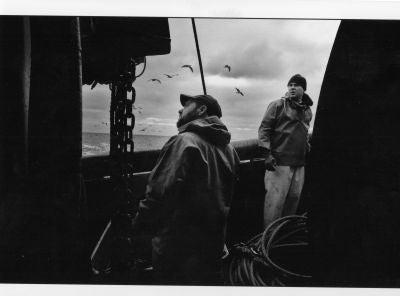By: David Stevens
David Stevens comes from a long line of St Ives fishermen and is part of his family run business. Their vessel, The Crystal Sea is a 20 meter trawler working out of Newlyn, which goes to sea 3-5 days depending on the weather, so as to maximise the quality and freshness of their catch. David skippers alongside his brother, Alec, with a crew of three others and their father working ashore with the nets and supplies.
I have been fishing now for nearly 25 years and in all of that time, the decisions that really matter, about how we fish and the amount we catch have been largely kept out of industry’s hands. The decisions made in Brussels by the European Union have had a huge impact on the way we run our businesses. We are often left wondering how seemingly straightforward policies have become so complicated and how, when introduced at the industry level, these laws just don’t work. I am hopeful, however, that fishermen can now lead the necessary management solutions to forge a prosperous and sustainable future.
Challenges of the discard ban
With the introduction of the EU discard ban, which requires fishermen to land and record any quota species they catch in order to prevent waste and increase sustainability, the time has come for fishermen to lead the way. As it stands now, the discard ban poses a big problem to us in terms of lack of flexibility with quota and the technical measures that create regulatory discarding. The relative shares of differing Member States also create a political issue when applying the ban to mixed fisheries. It’s important that fishermen are able to access the quota they need to be compliant on the water.
UK catch quota trial:
For the last two years my vessel, The Crystal Sea, has been involved in a pioneering project to reduce discarding in my fishery. Called the UK catch quota trial (CQT), this pilot project afforded me a small increase in quota with increased flexibility in exchange for fully documenting my fishery (we used cameras), and demonstrating ways to reduce my discarding of non-target fish. In effect, we have been adjusting to a discard ban trial, which has not been easy but it is a useful testing ground for what is to come under the landing obligation. Through our own innovation, working in partnerships, and with a lot of perseverance we have found our way through, successfully meeting the challenges and requirements that have been thrown at us in times of change.
The biggest problem we faced last year was a huge influx of juvenile haddock entering the stock. Environmentally, this is a good sign as it proves the stock is healthy. Unfortunately, this was an issue for us as fishermen working with cameras because we had to count every fish caught against our quota.
In the beginning I felt like tearing my hair out, but my brother Alec, the rest of the crew and myself put our heads together and came up with a plan to filter juvenile haddock out of the net. A lot of trial and error was involved, but we have been averaging around a 90-95 per cent reduction in haddock juveniles as a result of experimentation with mesh sizes in our fishing nets.
Where we go from here
We have learned from this trial that given the flexibility to go about our work in a way that enables us to respond to new challenges, fishermen are able to deliver on the Common Fisheries Policy’s (CFP) high level policies. The fishing industry needs to take control of the situation by explaining what we can achieve and what is stopping us from meeting the aims of the discard ban.
The lessons we have learned should be used to guide management through an established process of how to deliver a fully documented and clean fishery, as well as what is needed to achieve workable stock management and technical rules. However, the right incentives need to be in place and we must ensure trust on both sides. From what I have seen, cameras are the most effective tool to allow for this in certain segments of the fleet.
Often the existing EU technical measures framework prevents us from delivering effective solutions to meet the landing obligation by prohibiting the innovation and selectivity necessary for us to reduce discarding while still maintaining a viable business. Luckily, we have had great support from the Marine Management Organisation (MMO)[1], who helped secure the necessary dispensation with EU institutions so that we were able to experiment with our gear. They seem to understand well the problems that we face.
Management needs to be at a more regional level, allowing us to carry out the changes needed in our specific fisheries. Fishermen must have more ownership of the issues, replacing the dated ‘one rule fits all’ approach with a more flexible system that can meet the challenges ahead. Industry must be empowered to be the change we want to see.
[1] The MMO is the UK’s Fisheries Agency responsible for implementation of UK fisheries policy, control and enforcement.











